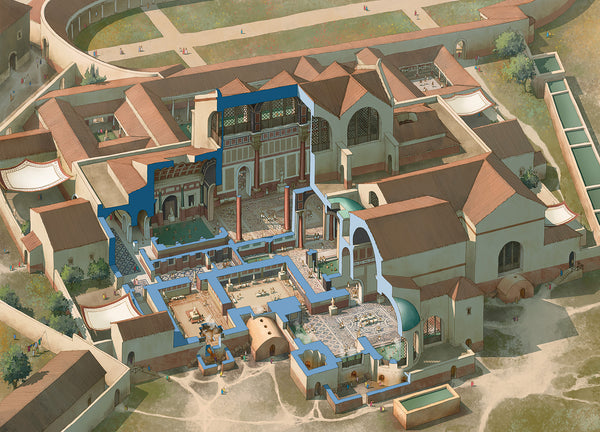History as inspiration
History, to paraphrase Edwin Starr, what is it good for? There are often discussions on the relevance of history and associated disciplines. If you’ve studied history or archaeology at college or university, you’ll undoubtedly have run into people – often family members – who asked you what you were actually going to do to earn a living after you’d finished your studies. After all, reading Thucydides or Cicero is a fun activity, but it doesn’t actually contribute anything to society, does it?
In an earlier blog post, I already touched upon why I think studying ancient warfare is important. The reasons listed there are all rational: ancient warfare, and by extension history in general, is important for this-or-that reason. There are, of course, also personal reasons (studying history is fun!), and you can also make a more sweeping statement that any country that doesn’t possess their own historians would be deemed intellectually backward.
But all of these reasons largely treat history as a subject worth studying in and of itself. But you can also treat history as a means to an end. Many artists, filmmakers, and especially writers have drawn inspiration from the past in order to create worlds that are partially or wholly imagined. A good example are the short stories found in pulp magazines back in the late nineteenth and first half of the twentieth century. I’ll briefly mention the work of two pulp authors.
Robert E. Howard (REH for short) created a hero, Kull, who lived in the distant past, in an age before the seas had swallowed Atlantis. Kull had come to Atlantis and managed to become king, where he had to contend, among other things, with the evil Serpent Men. When Kull didn’t prove popular enough, he was replaced by another barbarian, the famous Conan, who lived in the later Hyborian Age. REH’s stories were heavily inspired by real history, and it is not difficult to recognize what the sources of inspiration were for the Hyborian Age’s Aqualionians or the far-away country of Kithai.
Edgar Rice Burroughs (ERB for short), famous for Tarzan, created a hero who lived in the late nineteenth century, a soldier by the name of John Carter, who somehow managed, via astral projection, to arrive on the slowly dying planet of Mars, called Barsoom by the natives. The different groups of Martians on the planet use a mix of low and high technology. The green Martians are savage and take inspiration from Native Americans and the ‘barbarians’ known by the ancient Greeks and Romans, while the red Martians live in cities, use flying machines (airships), and even maintain atmosphere processors left behind by an earlier civilization.
Both REH and ERB drew inspiration from history and managed to instil their fictional worlds with a sense of history of their own, with civilizations rising and falling, barbarians tugging at the borders of more complex societies, and so forth. Their heroes appeal to the same primordial spirit that can also be found in ancient literature, such as Homer’s Iliad.
There are more examples that can be cited, of course, also outside of the pulps. J.R.R. Tolkien’s stories of Middle-earth, like the worlds imagined by REH, supposedly took place thousands of years ago on our own planet. Like other authors, Tolkien took inspiration from older literature and history in crafting his own stories, including The Hobbit, The Lord of the Rings, and The Silmarillion. Old English and Scandinavian poems informed much of his writing, which explains the inclusion of supernatural creatures such as dragons, elves, and orcs.
More modern examples of writers taking inspiration from history include George R.R. Martin, whose series of fantasy novels, A Song of Ice and Fire, are now better known as the television series Game of Thrones. The setting is inspired by somewhat romanticized notions of the medieval period, with some hints of the ancient world here and there: the Dothraki recall Herodotus’ descriptions of the Scythians and the level of intrigue shown in the series recalls the backstabbing and chaos of the age of Alexander’s Successors.
Some authors stay closer to established history, but provide their own unique spin on things. Examples include Thomas Malory’s Le Morte d’Arthur (1485) and Walter Scott’s Ivanhoe (1820), but there are also many modern authors who write historical fiction. Ben Kane, for example, focuses on ancient Rome, such as his The Forgotten Legion. Christian Cameron’s Tyrant series of novels is set in the time of Alexander the Great and focuses on the relationships between the Greeks and the Scythians. Scott Oden has written Men of Bronze, a book on a Punic mercenary who took part in the Battle of Pelusium on the side of the Egyptians, which recalls the muscular style of REH’s fiction.
So, history, then, what is it good for? Quite a lot of things, as it turns out, and not in the least does it serve as the source of inspiration for the stuff that we engage with when trying to wind down after a day’s hard work. It inspires what makes up a large chunk of our ‘(popular) culture’, for want of a better word.
If you have any creative ambitions, it might not be such a bad idea to follow the example of other great writers and hit the history books first, or delve into world mythology or ancient literature. Who knows, you might end up writing the next Game of Thrones.

